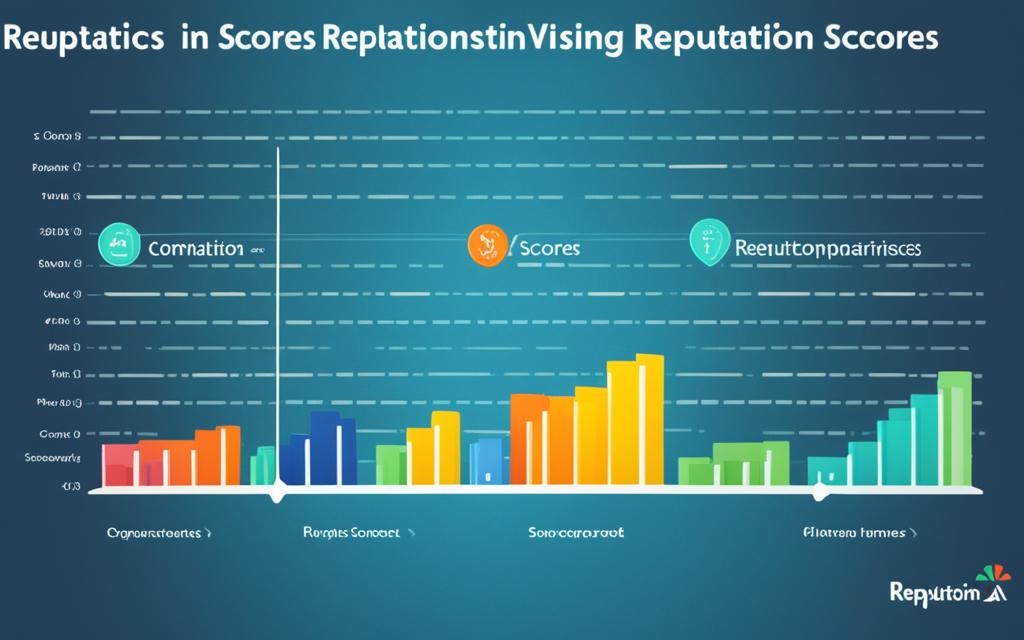In today’s world, brand reputation management is key for small businesses. It helps them stand out and stay ahead. Reputation Impact Analytics uses customer feedback and analysis to show how people see a brand. It shows what’s good and what needs work.
A strong online reputation score is very important. It affects search rankings and how visible a business is. Recent, good reviews help a lot, making customers more likely to choose you.
Handling reviews well shows you care about customers. This can make your ratings go up. Happy customers also stay with you, helping your business grow.
Having correct online info and being active on social media helps people find and trust you. Tools like Reputation Score X give tips to get more customers and grow sales. AutoNation saw big success thanks to these strategies.
Key Takeaways
- Reputation Impact Analytics merges customer feedback, sentiment, and competitive benchmarks into a single metric.
- A strong online reputation score positively influences search rankings and customer engagement.
- Review quantity, distribution, and recency are critical factors in maintaining a positive brand reputation.
- Timely and professional responses to reviews enhance consumer trust and satisfaction.
- Accurate online information and social media presence increase business visibility and customer accessibility.
- Reputation Score X provides actionable insights, driving business growth across various industries.
Understanding Reputation Impact Analytics
In today’s fast world, having a good brand name is key. Reputation Impact Analytics is a way to measure and manage how people see a company. It helps businesses know what people think of them. This is key for building trust and loyalty.
Definition and Scope
Reputation Impact Analytics looks at many areas like politics, business, and text analysis. It uses methods from game theory and psychology to help manage a company’s image. Tools for measuring public opinion are key to this.
Experts like Daniel Diermeier have made big steps in this field. They’ve created ways to manage a company’s reputation with detailed analysis.
Importance in Modern Business
Reputation Impact Analytics is very important today. It helps companies know what people think and how to stay positive. This leads to more trust, loyalty, sales, and being ahead of the competition.
Companies that do well here also get the best workers. For more info on why brand reputation matters, check out our in-depth guide.
Components of Robust Reputation Analytics
In today’s digital world, it’s key to know how to handle your brand’s online image. This means looking at three main parts: Sentiment Analysis, Brand Perception Metrics, and ROI Measurement. Each one is important for making a good plan to keep your brand in good shape.
Sentiment Analysis
Sentiment Analysis is a key step in checking your brand’s online feelings. It looks at what people say online about your brand. It finds out if they like, dislike, or don’t care about your brand.
Then, companies can make changes based on what people say. Using special tools gives quick info on what customers think.
Brand Perception Metrics
Knowing how people see your brand is very important. Things like star ratings and how many reviews you get matter a lot. They help show your brand’s reputation.
By watching these things, companies can see what needs to get better. This helps make customers happier. A good way to check on your brand’s image gives a clear picture of where you stand.
ROI Measurement
ROI Measurement shows how much money good reputation management saves or makes. It links your brand’s image with your business results. This proves that spending on keeping your brand good is worth it.
Handling these parts well means tracking, analyzing, and acting on what you find. For more info, check out strategies to boost your personal brand online.
The Role of Sentiment Analysis
Sentiment Analysis is key in Reputation Impact Analytics. It helps understand the feelings behind what customers say online. This way, companies know how their brand makes people feel. They can see if their customer service is working well.
It uses advanced tech to understand the deep meanings in customer feedback. This helps companies make their reputation better match what customers want. It makes the brand look better in people’s eyes.
For more tips on keeping a good online image, check out Reputation Return.
Using sentiment analysis helps spot what customers are feeling early. This lets companies fix problems before they get worse. It makes sure a company’s good name matches what customers think, making the brand more liked.
Brand Perception Metrics Explained
Understanding how people see your brand is key in today’s business world. Brand perception analytics show how customers think and act towards a brand. This helps companies make better plans to keep a good image and fix any bad feelings.
Why They Matter
These metrics are important because they affect how loyal customers are and what they buy. Things like star ratings, review counts, and how customers talk about a brand show how well it’s liked. Keeping an eye on these things helps businesses spot problems early.
Keeping a good brand image is key. A good way to do this is with reputation protection plans and being proactive.
How to Measure
To measure these metrics, you need to collect and analyze data from different places online.
- Review Platforms: Keep an eye on star ratings and what customers say.
- Social Media: Look at what people say and how they interact on social networks.
- Surveys: Use customer satisfaction surveys to get direct feedback.
- Engagement Analysis: Check how often and well customers talk to the brand.
Looking at this data helps businesses make smart choices based on what customers say. Using strong brand perception analytics can make customers happier and more loyal over time.
ROI Measurement in Reputation Analytics
In Reputation Analytics, we look at how much money we make from managing our reputation. It’s key to know the real growth impact and see the worth of spending on reputation management.
Calculating Returns
We link things like review scores and social media to sales and keeping customers. Good ways to calculate this turn these numbers into money values.
Impact on Business Growth
Studies show that managing your reputation well can really help your sales. This proves that looking after your reputation is key for growing your business.
The table below shows how reputation and business growth connect:
| Reputation Metric | Business Outcome |
|---|---|
| Review Scores | Increased Sales |
| Sentiment Analysis | Higher Customer Retention |
| Social Media Engagement | Improved Brand Loyalty |
By watching and measuring these things, businesses can see how their reputation efforts pay off. They can make smart choices to boost their money-making and keep growing.
Implementing Reputation Impact Analytics
Using the right tools and techniques is key to making the most of reputation analytics. These tools use AI, natural language processing, and machine learning. They look at lots of data to give insights and advice for your business.
Tools and Techniques
Tools like Brandwatch, Mention, and RepTrak are very good at what they do. They look at millions of data points to see how people feel about your brand. They help track how people see your brand and measure how well your efforts are doing.
Businesses can use these tools to make better plans for managing their reputation.
| Tool | Functionality | Benefits |
|---|---|---|
| Brandwatch | Social Media Monitoring | Real-time insights, competitor analysis |
| Mention | Reputation Management | Brand monitoring, sentiment analysis |
| RepTrak | Reputation Measurement | Comprehensive analytics, ROI tracking |
Case Studies
Many industries have seen big wins by using reputation analytics tools. For example, healthcare places have made patients happier and built trust. Auto dealerships have gotten more leads and sold more cars by listening to what customers say.
Competitive Benchmarking with Reputation Score X
Competitive benchmarking with Reputation Score X looks at a brand’s market spot. It uses competitive reputation analysis and key metrics. This gives a full view of where a brand is compared to others.

Understanding Your Position
First, knowing your market spot is key. Reputation Score X helps by looking at customer feelings, review data, and social media. This shows what makes a brand stand out and where it can get better. It helps spot strengths and areas to work on.
| Component | Description | Metric |
|---|---|---|
| Customer Sentiments | Analysis of customer feedback and emotional responses | Positive/Negative Sentiment Ratio |
| Review Data | Comprehensive review analysis across platforms | Average Ratings |
| Social Media Engagement | Interaction levels on social media channels | Engagement Rate |
Gaining a Competitive Edge
With a clear view of their spot, brands can make plans to stand out. They use the info from analysis and metrics to better their strategy. For example, they might work on customer service or making more positive content. This way, brands can boost their reputation and do better in the market.
For more on fixing a bad reputation, see Rebuilding a Tarnished Reputation: Your Comprehensive.
Leveraging Customer Feedback
Using customer feedback is key to a business’s good name. It helps understand what customers think and feel. This leads to better products and stronger bonds with customers.
The Value of Reviews
Reviews give honest looks at what customers think and want. They are vital for knowing what’s working and what’s not. Good reviews boost a brand, while bad ones show a company’s drive for better.
Strategies for Response
How a business responds to feedback matters a lot. Quick, caring replies show customers their voices are heard. This builds trust and loyalty.
Good strategies mean watching reviews closely and answering quickly and thoughtfully. Doing this makes a company more respected and can even help with search rankings.
The Power of Social Media Engagement
In today’s world, social media engagement is very important. It helps spread the word about a brand and lets people talk to customers directly.
Having a good online brand presence makes a brand stronger. It lets them talk more and build a community. This way, they can keep a good social media reputation and manage their image better.
Good ways to get more digital engagement are to answer customer questions fast. Share content that makes sense and ask users to share their own stories. Doing these things can make customers more loyal, increase sales, and improve relationships.
Here are the main benefits of being active on social media:
- Increased Brand Visibility
- Enhanced Customer Interaction
- Better Reputation Management
- Boosted Customer Trust
- Higher Business Growth
Impact on Search Rankings
Reputation Impact Analytics is key to a brand’s search engine ranking. Good SEO reputation management helps your business be more visible online. This makes it easier for people to find you.
Search engines like brands with up-to-date and helpful reviews. This leads to better rankings.
Having correct info online and being active on social media is important. These things help your brand look good and trustworthy. They also make your search rankings better.
| Key Factors | Impact on Rankings |
|---|---|
| Accurate Business Information | Ensures higher credibility and trust |
| Responsive Customer Reviews | Boosts engagement metrics |
| Active Social Media Profiles | Enhances online visibility |
By working on these areas, businesses can get better search engine rankings. This also helps keep a good online image. It brings in more visitors and helps your business grow over time.
The Importance of Accurate Online Information
In today’s world, having the right info online is key. Make sure your online info matches your real address, phone, and hours. This makes it easy for people to find and connect with you. It also builds trust with your customers and helps them decide to choose you.
Being right online helps your customers and helps with search results too. Search engines like businesses with the right info. This means you get seen more and ranked higher. This brings more people to your business.
Also, keeping your info current stops bad things from happening. Wrong or old info can make customers unhappy and hurt your brand. So, check and update your online info often to stay accurate.
By focusing on accurate info, you can keep your reputation good, improve your search rank, and connect better with customers. This makes your brand look strong and trustworthy online.
Harnessing Artificial Intelligence in Reputation Analytics
AI has changed how companies understand and act on big data. It helps process and understand lots of information. It uses Natural Language Processing (NLP) and Deep Machine Learning.
Natural Language Processing
NLP is key in reputation analytics. It quickly finds important info in text. With AI in reputation management, NLP turns raw data into useful info.
This use of cognitive computing helps companies understand what customers think. They can then change their plans to meet customer needs.
Deep Machine Learning Techniques
Deep Machine Learning makes data analytics innovation better. It predicts trends and what customers might do next. These smart algorithms look at millions of data points every day.
Using AI in reputation management, companies can not just understand data but also predict the future. This helps them manage their reputation better.
| AI Technique | Application | Benefit |
|---|---|---|
| Natural Language Processing | Textual Feedback Analysis | Extracts meaningful insights |
| Deep Machine Learning | Trend Prediction | Forecasts consumer behaviors |
Reputation Impact Analytics for Various Industries
Reputation Impact Analytics is key in many sectors. Each one has its own challenges and needs. By understanding these, companies can get better at managing their reputation.
This helps them do better in business. They can make strategies that fit their market well. This makes them stand out more.
Healthcare
In healthcare, having good reputation analytics is vital. It helps make patients trust them more. By using smart analytics, healthcare places can get better at what they do.
They can also talk better with people. This keeps patients coming back and helps give them better care.
Automotive
For cars, reputation analytics are big for selling and trust. They help dealers know what customers want. This lets them plan better.
Using smart strategies, car businesses can meet customer needs. This makes customers happier and more loyal over time.
Retail
Retail gets a lot from reputation analytics too. It helps keep customers coming back and makes brands stand out. Analytics show what shoppers like and don’t like.
This helps stores offer better things. They can make shopping better for everyone.
Conclusion
Reputation Impact Analytics is key for today’s businesses. It helps with planning and gives deep insights. It looks at brand health, what customers think, and how you stack up against others.
It uses advanced tools and artificial intelligence. This turns customer feedback into something that helps you grow.
Every industry gets its own special way to use reputation analytics. This means better customer experiences and a higher brand reputation in healthcare, cars, and stores. With a good plan and the right framework, companies can move forward with confidence.
Using reputation impact analytics well boosts your money making and makes your brand stronger in your field. As companies use more data, these analytics will keep being key to doing well and growing.
FAQ
What is Reputation Impact Analytics?
Reputation Impact Analytics combines customer feedback, sentiment analysis, and competitive benchmarks. It shows how a business stands against others and what steps to take to improve its online image.
Why is Reputation Impact Analytics important for modern businesses?
Today, what people think about a company matters a lot. Good reputation management helps with better search rankings, more customer engagement, and more loyalty. This leads to business growth.
What are the main components of Reputation Impact Analytics?
The key parts are Sentiment Analysis, Brand Perception Metrics, and ROI Measurement. These look at how people feel about a brand, what they think of it, and how a good reputation affects money.
How does Sentiment Analysis work in Reputation Impact Analytics?
Sentiment Analysis looks at the feelings behind what customers say and write online. It uses special tech to understand these feelings. This helps companies know how to make customers happier.
Why are Brand Perception Metrics important?
Brand Perception Metrics show how happy customers are and what they think of a brand. This affects their buying choices and loyalty. Knowing this helps companies improve and keep customers happy.
How can businesses measure ROI in Reputation Analytics?
To measure ROI, link reputation scores and feelings to sales and keeping customers. Good reputation management can really help increase money coming in.
What tools and techniques are used in Reputation Impact Analytics?
Advanced software with AI, natural language processing, and machine learning looks at lots of data fast. These tools give useful advice and help businesses improve.
How does competitive benchmarking with Reputation Score X work?
Competitive benchmarking compares a brand to others using customer feelings, reviews, and how much people interact with it. This shows strengths and weaknesses, helping make better strategies.
What is the value of customer reviews in Reputation Impact Analytics?
Customer reviews give honest feedback on what customers think and expect. Answering these reviews shows a brand cares, building trust and loyalty.
How does social media engagement contribute to reputation management?
Being active on social media makes a brand more visible and lets customers talk directly with it. A strong social media presence helps manage reputation, bringing in more customers and growth.
How does Reputation Impact Analytics affect search rankings?
Many and recent reviews, especially those answered quickly, help a brand rank better in searches. Being accurate online and having an active social media also helps be more visible.
Why is accurate online information important for reputation management?
Having the right and current business info makes it easy for people to find and visit. Being accurate builds trust and helps with making decisions, which affects a brand’s reputation and search rankings.
How is AI utilized in Reputation Analytics?
AI uses natural language processing and deep learning to understand lots of data fast. AI turns data into useful advice, helping companies manage their reputation better.
How do different industries use Reputation Impact Analytics?
Many fields like healthcare, cars, and shopping use reputation analytics made for their needs. These analytics help with patient trust, car sales, and keeping customers, showing how useful Reputation Impact Analytics is across different areas.














